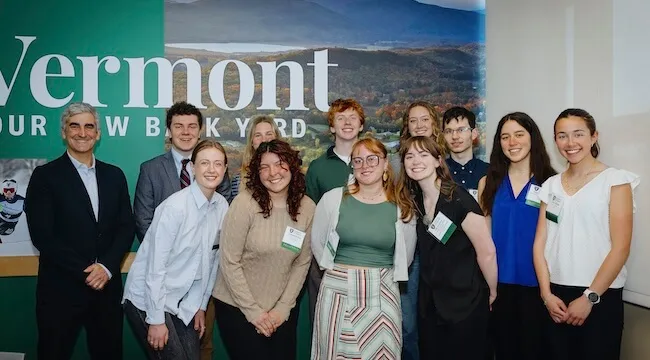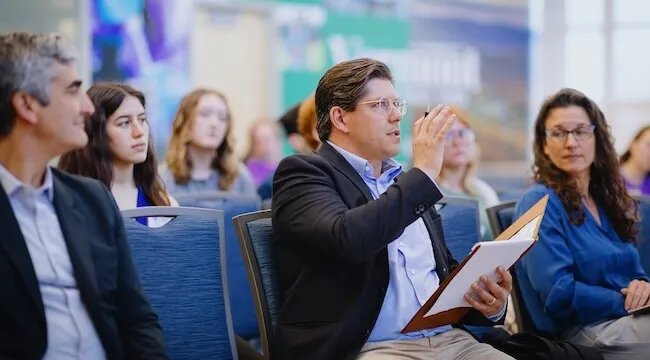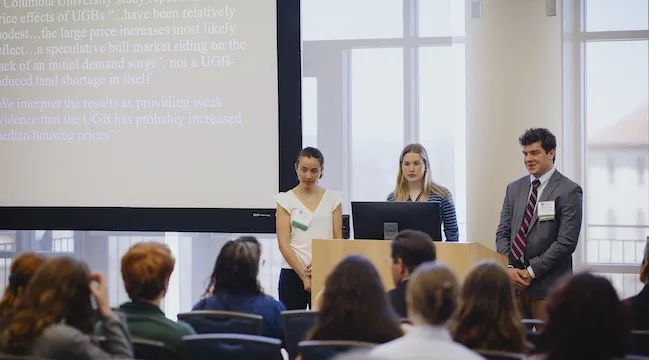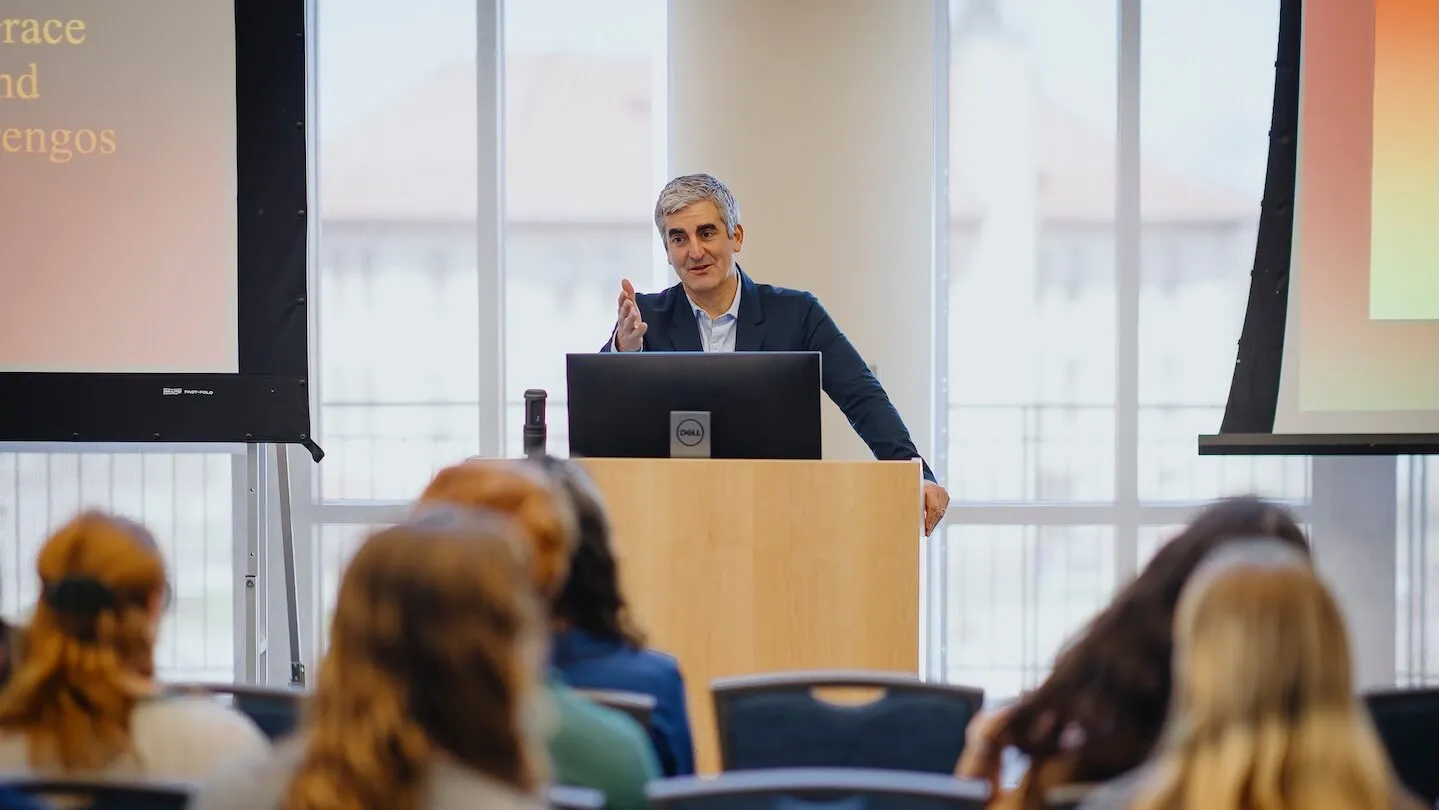Vermonters are facing unprecedented hurdles in their effort to secure affordable and safe housing. According to the Vermont Housing Needs Assessment: 2025-2029, Vermont is likely to need an additional 24,000-36,000 homes across the state in 2025-2029. To reach this target, the current rate of housing production in the state would need to approximately double.
The University of Vermont Patrick Leahys Honors College is invested in helping source solutions to the state’s housing crisis. This semester, the Honors College launched a new internship opportunity for 11 students called, “Finding a Path to 30,000 new Vermont Homes.” This exclusive opportunity was taught by the college’s first Leahy Scholar in Residence and former Burlington Mayor, Miro Weinberger.

Weinberger’s expertise in this area originates from his 15-year career as an affordable housing developer, and his 12-year stint in public office as Mayor of Burlington. He also serves as Executive Chair of Let’s Build Homes, a newly launched non-partisan coalition of Vermonters that strives to create an affordable, vibrant, and inclusive Vermont.
“It’s an honor to be named the first Scholar in Residence at the Patrick Leahys Honors College. It’s also particularly heartwarming as I previously interned in Senator Leahy’s office in the Spring/Summer of 1991, an experience that has had a huge impact on how my career evolved,” said Weinberger. “I am very grateful to have had the opportunity to work in public service roles and am energized to be contributing to this effort on campus, across the vibrant university community, and to have this unique opportunity to serve Vermonters in such an impactful way.”
“The Patrick Leahy Honors College prides itself on providing students the opportunity to excel in leadership and civic engagement,” said David Jenemann, Dean of the Patrick Leahys Honors College. “We foster a culture of research and scholarly inquiry that leads to solutions for dynamic, complex challenges, like Vermont’s housing crisis. We’re incredibly excited to have Miro as our first Scholar in Residence, guiding our students through this essential work that is directly affecting members of our community.”
To further action-oriented work like Vermont’s housing crisis, the Honors College is adding an important addition to its portfolio, a minor in civic engagement next calendar year for all UVM students.
“Vermont’s housing shortage has driven up housing prices to the point that half of our renters are rent-burdened, and we have one of the highest homelessness rates of any state in the country, as well as other social and economic challenges,” said Weinberger. “However, this is a problem that we can fix with policy changes and focus, while also protecting Vermont’s cherished landscape.”
This collaborative exploration for solutions to the housing crisis in Vermont taught students how to develop skills in policy and issue research, professional public policy memo writing, and subject matter expertise in a currently contested area of Vermont public policy. The interactive one-credit learning course met weekly and offered students insights and practical real-world examples of how policy decisions impact what projects get the green light.
In April, students visited the Nest, a Doug Nedde project in downtown Burlington that was completed in 2022. In speaking with developer Nedde, students learned how recent zoning reforms in Burlington made it possible to get this successful 49- home project built. “The offsite provided students a concrete understanding of how builders think about potential projects, and how public policy changes have a direct impact on what does and does not get built,” shared Weinberger.
“Miro is a practitioner in his work, and you can really feel that when you engage with him,” said Eliot Barrengos, CALS major and class member. “He gives great context to how things work on the ground, and he understands the Vermont landscape.”
The course also featured guest speakers such as Maura Collins, executive director of VHFA, and Alex Farrell, the Commissioner of the State’s Department of Housing and Community Development, both UVM alums.

To culminate their learning, students were divided into teams, assigned one aspect of the housing issue, and asked to develop a policy initiative paper on their topic. The topics all focused on policies that could help increase new housing supply:
- Act 250 mapping: students proposed pro-housing principles to guide the state as it maps out different Act “tiers”.
- Permit appeals reform: Students investigated how “vetocracy” gives abutting property owners too much power and the ability to veto significant housing projects in the state and what can be done to create a fairer, more predictable system.
- Attracting Capital: Students researched what it would take to bring in more capital to invest in housing across the state.
“This was such an awesome experience,” shared Penelope Keane, a CALS major and class member. “I’ve never written a policy memo before, so it taught me the foundation for how to present my analysis and recommendations for future work.”
On April 23, students presented their policy proposals to the UVM community and Vermont housing experts Maura Collins and Alex Farrell, in a session called, “Solutions to VT’s Housing Shortage,” at the annual Student Research Conference, hosted by the office of Fellowships, Opportunities, and Undergraduate Research (FOUR).

Weinberger reflected on the experience, “I have found it very hopeful to spend a semester with students who understand the impact the shortage is having on their lives, and who are committed to doing something about it.”
